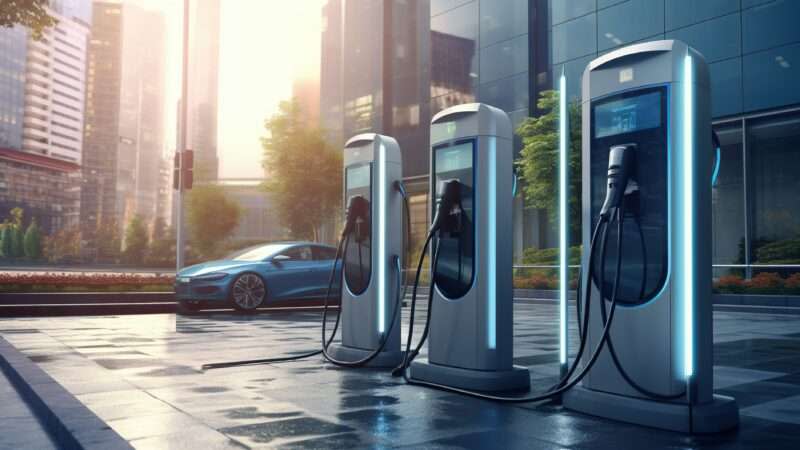Both Republicans and Democrats Want 'Buy American' Provisions for E.V. Chargers

- Oops!Something went wrong.Please try again later.
- Oops!Something went wrong.Please try again later.
While it may seem at times that America is hopelessly divided, there are some issues on which lawmakers seem to agree. For example, both Republicans and Democrats support protectionist policies that drive up prices for consumers.
From the first days of his administration, President Joe Biden has pledged that by 2030, electric vehicles (E.V.s) should make up at least half of all vehicles sold in the United States. The 2021 Infrastructure Investment and Jobs Act apportioned tens of billions of dollars to expand E.V. adoption, including $7.5 billion "to build out the first-ever national network of EV chargers." The administration hoped to build 500,000 chargers by 2030.
To be eligible for funds, E.V. chargers must be built in the United States, and the cost of the American-made components used in their construction must be "greater than 55 percent of the total cost of all components of the manufactured product."
But in February, the Federal Highway Administration (FHWA) waived the "Buy American" requirements for chargers "manufactured by July 1, 2024, whose final assembly occurs in the United States, and whose installation has begun by October 1, 2024." It noted that a temporary postponement "enables EV charger acquisition and installation to immediately proceed."
In July, Sen. Marco Rubio (R–Fla.) introduced Senate Joint Resolution 38, stating "that Congress disapproves" the waiver "and such rule shall have no force or effect." On Wednesday, the resolution passed in the Senate, 50–48; Sens. Sherrod Brown (D–Ohio), Joe Manchin (D–W. Va.), Jon Tester (D–Mont.), and Kyrsten Sinema (I–Ariz.) crossed the aisle to support the measure.
"Waiving the Buy America requirements on EV chargers won't help American taxpayers or workers," Rubio said in July. "It hurts American companies and empowers foreign adversaries, like China, to control our energy infrastructure. We should never use American dollars to subsidize Chinese-made products."
Interestingly, Democrats counter that Rubio is in fact the one responsible if the U.S. "subsidize[s] Chinese-made products." After it passed, Sen. Bob Casey (D–Pa.) called the resolution a "cynical political ploy" that "would do irreparable damage to American workers and manufacturing…by forever hindering our Nation's ability to become less reliant on Chinese manufacturing of EV chargers."
In a statement on Wednesday, the White House claimed that the resolution "would weaken Buy America requirements by reverting to FHWA's general waiver for manufactured products, allowing federal dollars…to be spent on chargers made in competitor nations like the People's Republic of China."
"If the President were presented with S.J. Res. 38," the statement concluded, "he would veto it."
The FHWA general waiver, established in 1983, "exempt[ed] manufactured products other than steel and cement" from provisions of the Buy American Act of 1933. But the 2021 infrastructure law mandated that "all iron, steel, and manufactured goods" used in federally funded projects be "produced in the United States."
"Currently, all manufactured products are covered by this 'waiver' of Buy America requirements, which until recently included EV chargers," the administration noted on Wednesday. "Last year, to ensure that the national network of EV chargers is Made in America, the Biden Administration issued a new policy that restores Buy America protections for EV chargers."
In other words, the Biden administration instituted Buy American provisions on E.V. chargers only to then suspend those requirements when it became clear they would disadvantage production. Senate Republicans then criticized the administration for waiving its own rules and reverting to a policy put in place 40 years ago.
Unfortunately, in neither case did lawmakers admit that Buy American policies are a form of economic protectionism that harms consumers by making their desired products more expensive. The Biden administration implicitly acknowledged this fact when it waived Buy American rules on E.V. chargers so that domestic manufacturers could catch up.
"Global demand for EV chargers is putting strain on the supply chain that makes it difficult, if not impossible, to meet the made-in-America standards and expedite construction of new chargers, states and companies warned in comments to the Department of Transportation," a Reuters report noted in February after the release of the FHWA rule.
The post Both Republicans and Democrats Want 'Buy American' Provisions for E.V. Chargers appeared first on Reason.com.

